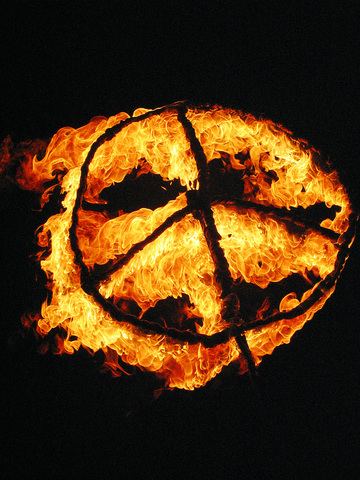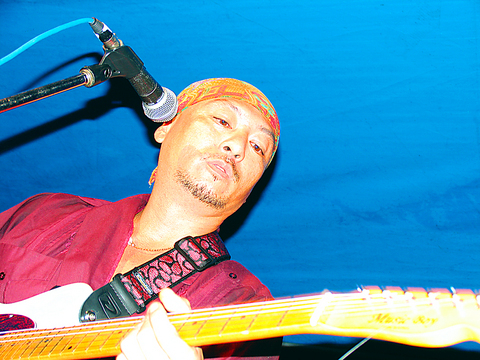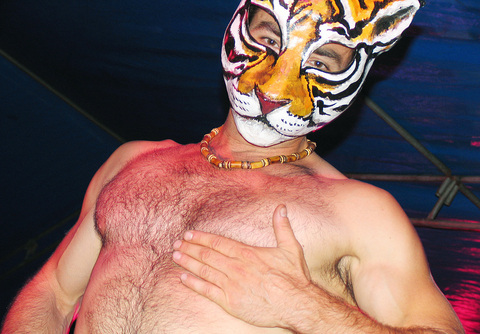There was a lot of "naluwan ho haiyan" going on at the Hoping for Hoping peace festival last weekend, but the high point of the event turned out not to be Aboriginal singer Kimbo (胡德天) and was instead the usual suspects on the local rock and festival scene.
The bands who got the mountainside herb garden hopping in Kunlun, Taoyuan County, were The Deported with a hi-energy set, an artful Chicken Rice (雞腿飯) and a perfectly poised Red-I and Bukake Posse, who will perform next Thursday at Luxy's new live night out.
Earlier, when the peace circle got going around dusk, Aboriginal singers Dakanow and Family started the groove with a largely extemporized performance that lulled the crowd with melodies and made it take notice with the occasional howl.

PHOTO: JULES QUARTLY, TAIPEI TIMES
For those not acquainted with peace circles, this one involved holding hands and circling at increasing speed toward the center, as in an Aboriginal dance. The mantra "naluwan ho haiyan" was repeated as the circle got underway.
We learned from the sleevenote of Kimbo's seriously good album In a Flash that this phrase has no meaning, but is used by all indigenous Taiwanese as a musical phrase that, according to Kimbo, "is the very source of our music."
He was my pick of the bands before the event, but as it turned out he was in and off like a selfish lover, leaving you wanting more.

PHOTO: JULES QUARTLY, TAIPEI TIMES
Otherwise all was sunny in the herb garden. There were plenty of stalls to keep people amused when they weren't looking at the bands and there was a great atmosphere. The oft-repeated line was, "It's better than Spring Scream, less commercialized."
As for those cynics out there who were saying, "I bet it won't happen and they will keep all the money they make for themselves, bloody hippies," it can be revealed that around NT$85,000 in profit was made from the two days of events and this will all be going to peace related charities. Detailed accounts will be posted on the Web site hopingforhoping.com.
The other gig of note last weekend, at Fusion in Tainan, was intended to be a celebration of producer Lee Yu-huan's (李雨寰) work -- in collaboration with Taipei's DJ Edmund -- but it all turned sour when gangsters started lobbing beer bottles at the DJ booth. Apparently the organizer got fined by the police and pissed at a DJ, so the party was shut down early.

PHOTO: JULES QUARTLY, TAIPEI TIMES
Edmund, who was not in the DJ box at the time, said, "It was terrible, one of the worst gigs I have ever played. ... I will never play there again."
Safe in Taipei this weekend there will be an MoS bikini party (again, free entry for the girls wearing very little), with the first-team roster of DJs Buff Wise, Damian Saint, Andrew V, Damian Yu and Tony. Tomorrow, our local hero DJ @llen will be on the decks. Jody Wisternoff from Way Out West will be playing a DJ set next week.
At Luxy, Koncrete Jungle presents Iron DJ, plus special guest Chozie, with the monthly drum 'n' bass/breaks faceoff. Saucey and Coffey will also be playing. Tomorrow, it's back to the 2F old-skool days, with a remix party, featuring Daryl, Joe Ho, J-Six, Reason, Vertigo, and Xiao Hei.

In the March 9 edition of the Taipei Times a piece by Ninon Godefroy ran with the headine “The quiet, gentle rhythm of Taiwan.” It started with the line “Taiwan is a small, humble place. There is no Eiffel Tower, no pyramids — no singular attraction that draws the world’s attention.” I laughed out loud at that. This was out of no disrespect for the author or the piece, which made some interesting analogies and good points about how both Din Tai Fung’s and Taiwan Semiconductor Manufacturing Co’s (TSMC, 台積電) meticulous attention to detail and quality are not quite up to

April 21 to April 27 Hsieh Er’s (謝娥) political fortunes were rising fast after she got out of jail and joined the Chinese Nationalist Party (KMT) in December 1945. Not only did she hold key positions in various committees, she was elected the only woman on the Taipei City Council and headed to Nanjing in 1946 as the sole Taiwanese female representative to the National Constituent Assembly. With the support of first lady Soong May-ling (宋美齡), she started the Taipei Women’s Association and Taiwan Provincial Women’s Association, where she

Chinese Nationalist Party (KMT) Chairman Eric Chu (朱立倫) hatched a bold plan to charge forward and seize the initiative when he held a protest in front of the Taipei City Prosecutors’ Office. Though risky, because illegal, its success would help tackle at least six problems facing both himself and the KMT. What he did not see coming was Taipei Mayor Chiang Wan-an (將萬安) tripping him up out of the gate. In spite of Chu being the most consequential and successful KMT chairman since the early 2010s — arguably saving the party from financial ruin and restoring its electoral viability —

It is one of the more remarkable facts of Taiwan history that it was never occupied or claimed by any of the numerous kingdoms of southern China — Han or otherwise — that lay just across the water from it. None of their brilliant ministers ever discovered that Taiwan was a “core interest” of the state whose annexation was “inevitable.” As Paul Kua notes in an excellent monograph laying out how the Portuguese gave Taiwan the name “Formosa,” the first Europeans to express an interest in occupying Taiwan were the Spanish. Tonio Andrade in his seminal work, How Taiwan Became Chinese,